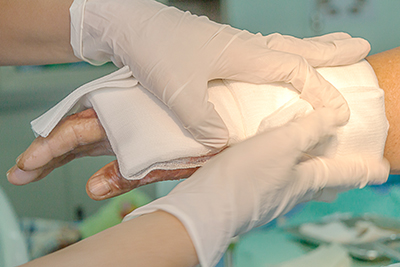News
- University experts team up with Team GB hockey Olympian to make school PE kits fitter for purpose and put ball in pupils’ court 17 July 2025 Top researchers have united with Team GB hockey player and sports inclusivity trailblazer Tess Howard MBE on a mission to help teenage girls feel more comfortable in their school PE uniforms – and own bodies – in a bid to boost self-confidence and sports participation.
- Research reveals majority of children who die in England have life-limiting conditions and exposes inequities in palliative care provision 10 July 2025 New research shows the majority of child deaths in England were among children with life-limiting conditions and highlights key shortcomings with their end-of-life care, prompting calls for urgent reform to tackle inequities in care.
- Inspirational Bristol student overcomes eating disorder to graduate as a doctor 9 July 2025 An inspirational student whose dream of becoming a doctor was threatened after battling an eating disorder and learning that her BMI was below the General Medical Council’s fitness to practise threshold wants to show others that perseverance pays off as she graduates from the University of Bristol with a distinction in medicine. In the top 5% of her class, she’s now set to begin her first rotation in geriatrics — a field close to her heart — at an NHS hospital in Chesterfield and Derby.
- Bristol graduate overcomes life-changing injuries to fulfil dream of becoming a doctor 8 July 2025 “It’s never too late” – these are the words Paul Edwards stands by, as he achieves his dream of graduating as a doctor from the University of Bristol. It's a milestone that almost never came as Paul’s journey to medicine began not with a university offer, but with a life-changing accident.
- International experts and patients unite to help ensure all patients are fully informed before consenting to new surgical procedures 8 July 2025 Leading doctors, researchers, and lawyers have joined forces with patient representatives and created the first-ever information guide to better support and protect patients across the world who are considering pioneering, but also potentially risky, surgery.
- New study finds routine vaccination holds key to reducing future mpox outbreaks in England 2 July 2025 Continuing to vaccinate for mpox through a routine targeted programme for gay and bisexual men delivered by sexual health services will greatly reduce the number of cases and save the NHS millions, new research has found.
- New exhibition explores mental health and community through art 2 July 2025 How does it feel to live in Weston-super-Mare when you are struggling with your mental health? What resources exist in the local community – and what barriers are there to accessing them? A new free exhibition coming to Weston Museum from Tuesday 8 to Thursday 17 July explores these questions through the creative storytelling of people who often feel excluded.
- ‘Good’ fats and inflammation: more complex than first thought 24 June 2025 Omega-3 fatty acids, popularly believed to reduce inflammation in the body, appear to increase certain inflammatory markers, researchers have found.
- A new bedtime recall exercise may enhance memory in older adults with and without Alzheimer's Disease 19 June 2025 A straightforward nightly activity may act as a memory-boosting tool, a new study led by the University of Bristol has revealed.
- £2.5 million for largest trial to improve outcomes from treatment for blocked leg arteries 17 June 2025 Blocked leg arteries – often caused by diabetes or smoking – are very common, but if left untreated can lead to amputation, or even death. To improve blood flow, a procedure called an angioplasty is usually carried out, with patients given blood-thinning drugs afterwards. A new trial led by North Bristol NHS Trust, in collaboration with the University of Bristol and the Centre for Trials Research at Cardiff University, will compare three commonly prescribed blood-thinning tablets to find out which works best.
- Suspended children are twice as likely to be involved in violence, even when accounting for their behaviour, finds new report 9 June 2025 A new study report has found that, even whilst controlling for a range of factors including measures of behavioural difficulties, children who are suspended or excluded from school are still nearly two and a half times more likely to become involved in violence and four and a half times more likely to offend compared to those who have not been suspended or excluded.
- Research suggests earlier kitten neutering does not affect bodyweight in later life 3 June 2025 Cats that are neutered at four months old compared to the traditional six months old are not at any greater risk of weight problems as they age, new research has found.
- Study reveals schools failing to address most common form of bullying: Weight-based victimisation 3 June 2025 A concerning gap in school anti-bullying policies has been revealed in a National Institute for Health and Care Research (NIHR) funded study by the University of Bristol and University of Bath. While weight-based bullying is reportedly the most common form experienced by students, fewer than 7% of schools in southwest England explicitly address it in their anti-bullying policies according to the study published in BMC Public Health.
- Early detection key to improving treatment of uveitis, a leading cause globally of vision loss 28 May 2025 New treatment guidance has been developed to help doctors tackle uveitis — one of the leading causes of vision loss. The new clinical guidance, by a team at the University of Bristol, aims to help thousands of sufferers keep this painful eye condition at bay. The study is published in JAMA today [28 May].
- Bristol professor joins Academy of Medical Sciences Fellowship 22 May 2025 A University of Bristol academic who is the Principal Investigator for the Children of the 90s health study has been elected a Fellow of the Academy of Medical Sciences. Professor Nic Timpson joins 53 exceptional biomedical and health scientists from UK institutions selected to the Academy for their exceptional contributions to the advancement of medical science.
- Study reveals stark ethnic and social disparities in stillbirths within individual hospitals and healthcare trusts in England 16 May 2025 Stillbirth rates are known to be higher for Black and Asian women than for white women, and those living in the most deprived areas are more at risk than those in the least deprived areas. Now a new University of Bristol-led study published in the Journal of Obstetrics & Gynaecology (BJOG) today [16 May] reveals that these disparities exist even within individual hospitals and NHS Trusts.
- School dinners may encourage picky teenagers to eat better, says new study 15 May 2025 Having school dinners rather than packed lunches could encourage picky eating 13-year-olds to eat a wider variety of foods, according to a new University of Bristol-led study. The findings are published in the Journal of Human Nutrition and Dietetics today [15 May].
- Breaking the cycle: supporting young boys in violent homes could prevent relationship violence, study suggests 1 May 2025 Young men growing up around parents who are physically violent to each other are 43% more likely to carry out violence or abuse in their own relationships, new University of Bristol research has found.
- Depression and other mental health conditions linked with immune response, study finds 30 April 2025 Depression, schizophrenia and other mental health conditions affect 1 in 4 people in their lifetime, but mechanisms underlying these conditions are poorly understood. New research led by researchers at the University of Bristol has linked the body’s immune response with schizophrenia, Alzheimer’s disease, depression, and bipolar disorder. The study demonstrates mental health conditions might be affected by the whole body as well as changes in the brain. The findings could pave the way for better treatments of some mental health conditions.
- What research needs to be prioritised in global burns – results from a project spanning 88 countries 24 April 2025 Each year, more than 11 million people worldwide suffer serious life-changing burns, affecting both adults and children. The largest-ever project of its kind — the Priorities in Global Burns Research partnership, led by the University of Bristol — has identified the top 10 priorities in burns care research from 88 countries. The findings are published today [23 April] in The Lancet Global Health.
Population Health Sciences
Press releases relating to Population Health Sciences.
Translational Health Sciences
Press releases relating to Translational Health Sciences.
Events
Forthcoming events at Bristol Medical School.



















